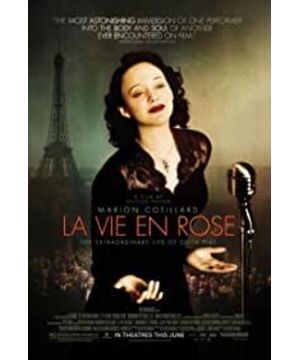Edith Piaf was born in Paris on December 19, 1915. In the midst of World War I, she grew up in a turbulent world and a poor and turbulent family. Her father who performed jiu-jitsu in the circus and her mother who sang on the streets gave her talent and made her a legend. her. From a low-level street singer to a star who sings on the high Olympia stage, she passed by in a hot and cold world, a good teacher and a friend, she passed by tenderness and sweetness, everyone admired her, she passed by heartbreak and loneliness, she passed by during World War I She was a child abandoned by her parents. During World War II, she disregarded the threat of the Nazis and performed on the same stage with the Jews. She had a rough life. After many car accidents, she once fell on the stage. Feeling the mysterious power for a moment, she knew that she was born to sing, and she would spend her whole life singing, singing like a warrior, fighting against unfortunate fate, moving all beings with her soul, and praying to God with her singing.
1.47 meters tall, with a thin and thin body, with big childlike eyes shining innocently, she looks weak and pitiful, but when she starts to sing, she is full of strength, this is Edith Piaf. She grew up at the bottom and entered the upper class because of her beautiful singing voice. She saw all kinds of social conditions, saw through hypocrisy and saw through snobbery. She sang about street prostitutes, she sang hypocritical gentlemen and vulgar ladies, she sang to these gentlemen and ladies, because she Hate; she also loves, she sings love songs to those she loves; she has faith, she sings herself, and God is listening.
In the long shot of the film, there is another Piaf, the Piaf performed by Marion Cotillard. She uses a dramatic performance to express Piaf's dramatic life. The long shot of the montage followed Edith Piaf's life, and the stream of consciousness narrative showed and crossed the memories of Piaf who was about to leave the world one by one. Just like Piaf's singing, she melded love, hate, resentment, ridicule, and mockery of reality into deep passion to sing the handed down songs. The long shot is like a musical note, the reality is the drama, the drama is the reality, no matter in the street or in the pub, in the alley or in the theater, there is always a stage in the real shot, and the shot itself is another stage. Piaf has a stage inside, this one. The stage gave her an outlet for her closed heart, and she could express herself to the fullest. She was connected with the world that once made her feel depressed. She had the same singing voice, who once stood on the street corner to pick up the women upstairs from the street. The coins thrown from the window once stood on a high stage to be worshipped by others, interviewed by records, radio and television, and touted gossip in magazines and tabloids... God did not care much for her, and the world in the camera was always invisible, like a full stage, She detoured in the narrow corridor between the backstage and the stage, with God's blessing, her fate has been twisted and turned, otherwise, even if she has a love song, she will just repeat the mistakes of her mother.
She has two mothers, a self-abasement and selfish mother uses an artist to advertise herself, a casual and pious mother who is full of motherly love trades her body for food and clothing, and a mother who looks at her as if she sees a humble self who has no love for her. A mother sees her as if she sees a life-saving straw. She is no longer lonely in a cold world. The two mothers who raised her when she was young gave her a disintegrating character. She has low self-esteem and narcissism and is not moved by the world. She sings roses with passion. In life, she is like a lotus flower that emerges from the mud and is not stained. The market failed to bury her, and the upper class failed to erode her. She lived her own life and was tenacious. Her life experiences were different. She was discriminated against at the bottom. Her talent was discovered by the nightclub owner who could appreciate her, which gave her the opportunity to step into the upper class step by step. The unfamiliar upper class was her stage. When she stood on the stage of the nightclub and sang the bitterness and anger of the bottom, she could find and appreciate her. Singing ears and talent made her become the child who was once fostered in a brothel and cared for by a group of women, and people turned around her. And she's looking for someone she can love.
She sings Life of a Rose, her love experience is rich and colorful, her love with Yves Montan is well known to the French, and no one knows why they suddenly separated. The love story with a famous boxer became a topic of great interest in newspapers in 1947. This love ended in an air crash, and the boxer left her forever. After that, her love story continued. She suffered two serious car accidents and became addicted to drugs during the treatment, which caused her body to decline prematurely. Her rose life continued, marriage and love, until she was almost finished. while still in love. She said that singing and love are indispensable in her life, otherwise life has no meaning.
At the end of her life, she ignored the doctor's advice and insisted that the Olympia concert in 1960 will continue as usual. A song "No, I Don't Regret Nothing" is like a dying prayer. At this time in the film, she faces the audience humbly. Marion Cotillard's performance lives up to expectations. She can not only play herself a few decades older, but also interpret the look and eyes of a person who has experienced real vicissitudes and faced God's inner humility. Come out, this young actress will be the pride of another France. In September 1962, Edith Piaf sang Le Jour le plus long for the whole of Paris under the Eiffel Tower, her brilliance was unparalleled. Edith Piaf died in Cannes in 1963.
At the end of the film, Piaf flashed back all the past in her memory. She doesn't regret everything. Although fate has been unfair to her, although she has made many mistakes, her father has given her love, but she has never cared about it. There was a little girl, but because of her negligence and indifference, her child repeated her unfortunate childhood. Her child died and meningitis. In the camera, she looked back at the camera in panic when she rushed to the hospital in a panic. Facing the camera at the hospital, she looked up at the sky in fear and shame. The past is like the wind. In her last days, there was a day in the picture. Her rose life, this film, all went to the end with the song.
Bazin's long-shot theory is vividly subverted in this film. The shot is long and singing, full of dramatic inner passion, and poetic intuitive and lyrical.
Please do not reprint TOM's special manuscript
View more about La Vie En Rose reviews











